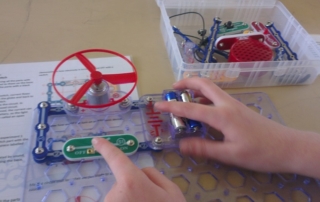Project Description
Introductory Science Workshop
Not sure what science topic to offer your Foundation/Prep/Kinder students? Mad About Science now offers an Introductory Science Workshop just for schools!
This workshop acts as a great general introduction to the diverse areas of science. Presented in a 90-minute format or a 60-minute format, this immersive workshop is recommended as your first Mad About Science visit. It includes whole class demonstrations as well as rotations of exploration tables.
Based on a developmental approach, six workstations are set-up to engage children in a variety of open-ended science activities.
Each table is set up with a different science theme, including magnetism, electricity, chemistry, forces, light and colour, and mini beasts. Children use the materials and activities at their own pace, supported by the presenter and your staff. Teachers are encouraged to assist, ideally one adult per workstation during a session.
Lead by qualified and experienced facilitators, this science enrichment workshop is now available in Victoria, NSW, and Queensland.
Level: Foundation/Prep/Kinder
Duration: Available in a 60 or 90 minute format
Numbers: Each workshop can cater to a maximum of 30 children. However, smaller groups have better access to equipment and the facilitator
State: VIC, NSW & QLD
Learning Outcomes
What is a chemical? Our whole world is made up of chemicals.
Natural and man-made polymer chemicals, and their special properties. Real life uses of polymer chemicals and materials.
How to identify acids and bases using indicators. Combining acids and bases to alter pH and neutralize solutions.
Mixing chemicals can cause chemical reactions. Demonstrating chemical reactions including elephant toothpaste fun.
Concepts on Exploration Tables
- Chemical Science | Polymer Exploration
Chemistry is about chemicals. A special type of solid chemical is a polymer. Polymers can be strong, stretchy or thirsty. Erupt instant snow. - Biological Science | Living Things
Biology is about life. You can take a closer look at creatures (in resin) that you would not normally be able to get up close to. Observing fun with magnifying classes, talking microscopes and life cycle puzzles. - Physical Science | Forces
Forces are about pushing and pulling, dropping, spinning and making things fly. Gravity is a force we experience every day. - Physical Science | Electricity
Electricity can be static or flowing. We are using the potential/stored energy in batteries to create an electrical circuit with Snap Circuits. - Physical Science | Optics – Light & Colour
Light is a kind of energy. Some lenses can bend light to help us see. Reflecting and emitting light can lead to the different colours we see. White light is all around us. - Physical Science | Magnetism
Magnetism is an invisible force that can attract (pull closer) or repel (push away) another object if it is made with magnetic materials inside, even from a distance.
Victorian Curriculum Links
People use science in their daily lives (VCSSU041)
Living things have a variety of external features (VCSSU042)
Living things grow, change and have offspring similar to themselves (VCSSU043)
Objects are made of materials that have observable properties (VCSSU044)
The way objects move depends on a variety of factors including their size and shape: a push or a pull affects how an object moves or changes shape (VCSSU048)
Compare observations and predictions with those of others (VCSIS054)
- Objects can be sorted into groups based on their properties, and some objects can be mixed and changed (VCSSU033)
NSW Curriculum Links
- Investigations of changes provide knowledge and understanding. Describe the changes in an animal as it goes through its life cycle lives (ST1-SCI-01)
Identifies and describes characteristics of living things, properties of materials, and movement. Living things have characteristics. Examine animal bodies, their body coverings (STE-SCI-01)
Poses questions based on observations and information to investigate cause and effect. Recognise that a force is a push or a pull that can make things either start moving, stop moving, change speed, direction or shape. Pose questions and test the effects of forces on an object’s movement (ST1-PQU-01)
Australian Curriculum Links
Pose questions and make predictions based on experiences (AC9SFI01)
Compare observations with predictions with guidance (AC9SFI04)
Describe how objects move and how factors including their size, shape or material influence their movement (AC9SFU02)
Engage in investigations safely and make observations using their senses (AC9SFI02)
Explore the ways people make and use observations and questions to learn about the natural world (AC9SFH01)
Observe external features of plants and animals and describe ways they can be grouped based on these features (AC9SFU01)
Living things grow, change and have offspring similar to themselves (ACSSU030)




